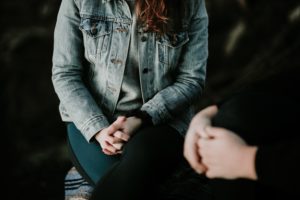After living in a household for most of my life with a family member who was suffering from severe Alcohol Use Disorder (AUD), I understand the emotional roller coaster that accompanies the condition.
 It was only over the last couple of years that I became aware of the drinking habits that he hid from the rest of the family but nevertheless, the behaviors inflicted on the family were ever present. As a child, I had no idea how to address the issue and help him with his addiction. It was only after a crisis caused the truths of what we had been living through to become evident to the whole family that I could begin the healing process.
It was only over the last couple of years that I became aware of the drinking habits that he hid from the rest of the family but nevertheless, the behaviors inflicted on the family were ever present. As a child, I had no idea how to address the issue and help him with his addiction. It was only after a crisis caused the truths of what we had been living through to become evident to the whole family that I could begin the healing process.
It was not evident where the family should turn initially. I couldn’t believe that my life was falling to pieces and I had no idea what to do. The chaos that we had been living with finally had an explanation. Yet we were new to even the idea that this could be in our family, far less have an awareness of where to get help. Eventually, we found and attended Ala-non and Ala-teen meetings, where we learned more about the condition and changed our focus from his to our own wellbeing. The meetings helped me learn how to mend the shreds of my life back together. These organizations have a close relationship with AA and it was there that we found comfort in being able to share with other people going through similar crises in their lives. They understood how we felt, did not offer judgment or advice but simply let us listen and learn to understand.
Through these programs, we discovered that AUD was, in fact, a condition that we had no control over. We realized that AUD was a family condition that affected everyone. The manipulation and mistrust that alcohol users exhibit spread to all other members of the family. Family members in this situation often become victims of manipulation and start to manipulate other members in order to keep the chaos at bay. This dysfunctional cycle is what tears families apart.
While on the path to recovery, it is important to keep in mind that there is a light at the end of the tunnel even if sometimes it still feels like an emotional roller coaster. It isn’t easy and there are times when I feel there is no hope for healing our family but it is essential that I remember that there is something to work towards: a wholesome, functioning family. Keeping this in mind, I am able to persevere through difficult points in my family’s recovery and maintain the motivation to do my part in overcoming the condition.
In short, there is no easy path to overcome AUD and it is easy to lose hope. But it is important to understand that taking care of yourself should be your first priority and recognizing what you can and cannot control. Finding programs such as Ala-non and Ala-teen as well as personal therapy is a great starting point for anyone in this situation. It’s common to feel isolated and lost in your own despair, but as cheesy as it sounds, things will get better and there is hope for you and your family. While you may feel isolated through this process, there is help for you and with the help of programs, therapy, and the people around you, there is hope for you and your family.
For more information on Alcohol Use Disorder and available resources please visit: SAMHSA – Alcohol Use Facts & Resources
Please complete the survey linked here to measure the effectiveness of this blog: Blog Survey
